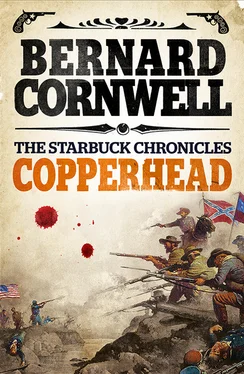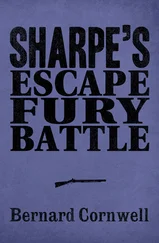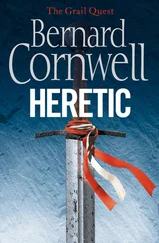The Faulconer Legion would be the last infantry regiment to leave the Manassas positions, and the last, presumably, to march into the new fortifications that were being dug behind the Rappahannock River. The retreat meant ceding even more Virginia territory to the northerners, and for days now the roads south through Manassas had been crowded with refugees heading for Richmond.
The only defenses left behind at Manassas and Centreville would be the Quaker guns, the same fake weapons that had brooded across the landscape all winter to keep the Yankee patrols far from Johnston’s army. That army had been wondrously supplied with food that had been painstakingly hauled to the Manassas depot by trains all winter long, but now there was no time to evacuate the depot and so the precious supplies were being burned. The March sky was already black with smoke and rich with the smell of roasting salt beef as Starbuck’s company torched the last rows of boxcars left in the rail junction. The cars had already been primed with heaps of tinder, pitch, and gunpowder, and as the burning torches were thrust into the incendiary piles, the fire crackled and bellowed fiercely upward. Uniforms, bridles, cartridges, horse collars, and tents went up in smoke, then the boxcars themselves caught fire and the flames whipped in the wind and spewed their black smoke skyward. A barn full of hay was torched, then a brick warehouse of flour, salt pork, and dry crackers. Rats fled from the burning storehouses and were hunted down by the Legion’s excited dogs. Each company had adopted at least a half-dozen mongrel mutts that were lovingly cared for by the soldiers. Now the dogs seized the rats by their necks and shook them dead, scattering blood. Their owners cheered them on.
The boxcars would burn till there was nothing left but a pair of blackened wheels surrounded by embers and ash. Sergeant Truslow had a work party pulling up rails and stacking them on burning piles of wooden ties soaked in pitch. The burning stacks generated such a fierce heat that the steel rails were being bent into uselessness. All about the regiment were the pyres of other fires as the rearguard destroyed two months’ worth of food and a winter’s worth of stored equipment.
“Let’s be moving, Nate!” Major Bird strode across the scorched depot, jumping in alarm as a box of ammunition caught fire in one of the boxcars. The cartridges snapped like firecrackers, forcing an incandescent blaze in one corner of the burning wagon. “Southward!” Bird cried dramatically, pointing in that direction. “You hear the news, Nate?”
“News, sir?”
“Our behemoth was met by their leviathan. Science matched wits with science, and I gather that they fought each other to a standstill. Pity.” Bird suddenly checked and frowned. “A real pity.”
“The Yankees have a metal ship too, sir?” Starbuck asked.
“It arrived the day after the Virginia’s victory, Nate. Our sudden naval superiority is all for naught. Sergeant! Leave those rails, time to be on our way unless you wish to be a guest of the Yankees tonight!”
“We lost our ship?” Starbuck asked in disbelief.
“The newspaper reports that it floats still, but so does their monstrous metal ship. Our queen is now matched by their queen, and so we have stalemate. Hurry up, Lieutenant!” This injunction was to Moxey, who was using a blunt knife to cut through the hemp rope of a well bucket.
Starbuck’s spirits sank. It was bad enough that the army was yielding Manassas Junction to the Yankees, but everyone had been cheered by the sudden news that a southern secret weapon, an iron-sided ship impervious to cannon fire, had sailed into the Hampton Roads and decimated the northern blockading squadron of wooden warships. The U.S. Navy’s ships had turned and fled, some going aground, others sinking, and the rest simply making what desperate speed they could to escape the clanking, smoke-dark, plodding, but vengeful Virginia, the ironclad fashioned from the hulk of an abandoned U.S. Navy ship, the Merrimack. The victory had seemed compensation for Manassas’s abandonment and promised to destroy the strangulation of the U.S. Navy’s blockade, but now it seemed that the North had a similar beast which had succeeded in fighting the CSS Virginia to a standstill.
“Never mind, Nate. We’ll just have to settle the war on land,” Bird said, then clapped his hands to encourage the last of the men to leave the burning railyard and form up on the road leading south.
“But how in God’s name did they know we had an iron ship?” Starbuck asked.
“Because they have spies, of course. Probably hundreds of them. You think everyone south of Washington suddenly changed their patriotism overnight?” Bird asked. “Of course they didn’t. And some folks undoubtedly believe that any accommodation with the Yankees is better than this misery.” He gestured toward another group of pitiful refugees and was suddenly assailed by an image of his own dear wife being forced from her home by the invading Yankees. That was hardly a likely fate, for Faulconer County lay deep in the heart of Virginia, yet Bird still touched the pocket in which Priscilla’s portrait was carefully wrapped against the rain and damp. He tried to imagine their small house with its untidy piles of music and its scatter of violins and flutes being burned by jeering Yankee troops.
“Are you all right?” Starbuck had seen the sudden grimace on Bird’s face.
“Enemy horse! Look lively!” Sergeant Truslow shouted at his company, but he also intended the sudden bellow to startle Major Bird out of his reverie. “Yankees, sir.” Truslow pointed north to where a group of horsemen was silhouetted against the pale trunks of a far wood.
“March on!” Bird shouted toward the head of the Legion’s column, then he turned back to Starbuck. “I was thinking of Priscilla.”
“How is she?” Starbuck asked.
“She says she’s very well, but she wouldn’t say anything else, would she? The dear girl isn’t one to worry me with complaints.” Bird had married a girl half his age and, in the manner of a confirmed bachelor falling at last to the enemy, regarded his new bride with an adoration that verged on worship. “She says she’s planted onions. Is it too early to plant onions? Or maybe she means she planted them last year? I don’t know, but I am so impressed that the dear thing knows about onions. I don’t. Lord knows when I’ll see her again.” He sniffed, then turned to look at the distant horsemen who seemed very wary of the lavish display of wooden guns that threatened their approach. “Onward, Nate, or backward rather. Let us yield this field of ashes to the enemy.”
The Legion marched past the burning storehouses, then through the small town. A few of the houses were empty, but most of the inhabitants were staying behind. “Hide your flag, man!” Bird called to a carpenter who was defiantly flying the new Confederate battle flag above his shop. “Fold it away! Hide it! We’ll be back!”
“Is anyone behind you, Colonel?” The carpenter inadvertently gave Bird a promotion.
“Just some cavalry. After that it’s all Yankees!”
“Give them bastards a good whipping, Colonel!” the carpenter said as he reached for his flag.
“We’ll do our best. Good luck to you!”
The Legion left the small town behind and marched stolidly along a wet and muddy road that had been torn apart by the passage of refugee wagons. The road led to Fredericksburg, where the Legion would cross the river, then destroy the bridge before joining the bulk of the southern army. Most of that army was retreating on a road farther west which went direct to Culpeper Court House where General Johnston had his new headquarters. Johnston was assuming that the Yankees would swing wide in an attempt to turn the river line and that a great battle would therefore need to be fought in Culpeper County; it would be a battle, Bird observed to Starbuck, which would make the fight at Manassas look like a skirmish.
Читать дальше












